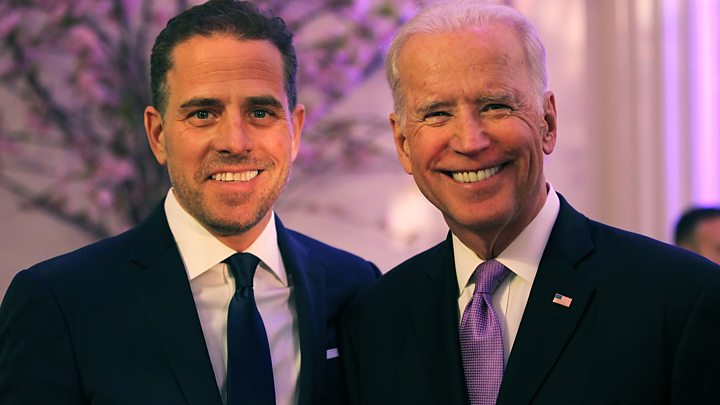
Media playback is unsupported on your device
The White House has officially refused to co-operate with the impeachment inquiry against President Donald Trump.
A letter sent to Democratic leaders rejected it as "baseless" and "constitutionally invalid".
Three Democratic-led House committees are investigating Mr Trump.
The inquiry is trying to find out if the president held back aid to Ukraine to push it to investigate Joe Biden, who is running for the Democratic presidential nomination.
The White House letter comes hours after the Trump administration blocked the US ambassador to the European Union from appearing before a congressional impeachment investigation.
What does the letter say?
White House counsel Pat Cipollone addressed the eight-page letter to the leading Democrat and House Speaker, Nancy Pelosi, and the three chairmen of the Democratic committees.
He accused the leaders of setting up an inquiry that "violates fundamental fairness and constitutionally mandated due process".
The letter insisted that, because Democrats did not hold a vote on launching impeachment proceedings in the House, the inquiry was "constitutionally invalid".
The letter also accused Democrats of trying to change the 2016 election result, and "deprive the American people of the President they have freely chosen".
"In order to fulfil his duties to the American people... President Trump and his Administration cannot participate in your partisan and unconstitutional inquiry under these circumstances."
In response, Ms Pelosi called the letter "manifestly wrong" and accused Mr Trump of trying to "normalise lawlessness".
"Mr President, you are not above the law. You will be held accountable."
What's the latest in the impeachment inquiry?
Mr Cipollone's letter comes hours after the White House blocked Gordon Sondland, the US ambassador to the EU, from speaking to the three Democratic committees behind closed doors.
Text messages released last week show Mr Sondland discussed efforts to pressure Ukraine over Mr Biden with other US diplomats.
His lawyer Robert Luskin said Mr Sondland was "profoundly disappointed" as he had travelled to Washington from Brussels in order to prepare for his appearance.
"Ambassador Sondland believes strongly that he acted at all times in the best interests of the United States, and he stands ready to answer the Committee's questions fully and truthfully," the statement said.
In a tweet, the president said Mr Sondland would only have been appearing before a "kangaroo court".
But House intelligence committee chairman Adam Schiff told reporters the envoy had text messages or emails "deeply relevant" to the inquiry on a personal device. He said those communications had been passed to the Department of State, which was withholding them.
"The failure to produce this witness," the California Democrat added, "the failure to produce these documents, we consider yet additional strong evidence of obstruction of the constitutional functions of Congress."
On Wednesday, Republican Senator Lindsey Graham - a staunch Trump ally - told Fox News' morning show that he does not believe the Ukraine matter is an impeachable offence.
Mr Graham of South Carolina added that he plans on asking his fellow senators to sign a letter to Mrs Pelosi in an effort to stop the impeachment proceedings "before she destroys the country".
A self-inflicted wound
Analysis by Jonathan Turley, legal scholar
The letter rightfully raises concerns over the lack of a House vote and the secrecy of proceedings. The Democrats have limited Republicans in their effort to question witnesses and secure material. However, that is not a legitimate basis for refusing to co-operate or supply clearly material evidence.
The letter emphasises a lack of due process in the proceedings. Yet the constitution does not expressly require anything other than a vote of the House on impeachment itself and a majority threshold for any referral of the matter to the Senate for trial.
This is a constitutional function of the highest order for Congress. There is a legitimate basis for congressional investigation under both its oversight and impeachment authority. If proven, these allegations of self-dealing could be a basis for articles of impeachment. A president cannot simply pick up his marbles and leave the game because he does not like the other players. A refusal to co-operate with a constitutionally mandated process can itself be an abuse of power.
Mr Trump's earlier tweet about wanting an ambassador to testify (but blocking him because he does not trust the committee) is the death knell for a privilege claim. A president cannot withhold material evidence because he does not like the other party in control of a house of Congress. It must be based on a claim that disclosure, even to a co-equal branch, would undermine national security or diplomatic relations or essential confidential communications.
This letter repeats that flawed premise for refusing to co-operate. It is a curious move since tweets by Mr Trump could be dismissed (as the Department of Justice did in the immigration litigation) as not reflective of the real position of the government. Now, the White House counsel himself has embraced those same arguments.
The letter is another avoidable self-inflicted wound by a White House that seems intent on counter-punching itself into an impeachment. There are defences here as well as viable privilege arguments. This letter however is eviscerating those defences with a reckless abandon.
Jonathan is professor of constitutional law at George Washington University
Two weeks into the House of Representatives' impeachment inquiry, the US is approaching a constitutional crisis.
While the White House's written response to Speaker Nancy Pelosi took eight pages, the message was simple. No depositions. No documents. No co-operation whatsoever.
The administration is questioning the legitimacy of the entire investigation, calling the process "unconstitutional". Democrats counter that the constitution itself gives the House "sole power of impeachment" - and that they will continue their investigation with or without the White House's consent.
Democrats at this point have several options. They could cite the administration for obstruction and make that, itself, an article of impeachment.
They could attempt to accommodate the White House's unspecified demands, hoping to encourage its assistance.
Or they could try to use the courts to compel the White House to co-operate.
The judicial branch, however, might be loath to adjudicate a stand-off that is nothing short of political warfare. This raises the very real prospect that Mr Trump may not feel he has to respect any conclusions drawn by the House - and, if it comes to it, call into question the validity of a Senate trial, as well.
This is uncharted territory. And as both sides acknowledge (albeit drawing entirely different conclusions), the presidency - and perhaps the rule of law itself - are at stake.
Why is there an impeachment inquiry?
The Democratic-led inquiry is seeking to find out if the president withheld nearly $400m (£327m) in aid to pressure Ukraine's President Volodymyr Zelensky to set up an inquiry into Mr Biden.
Hunter, Mr Biden's son, once sat on the board of a Ukrainian energy company.
Mr Trump and his supporters believe Joe Biden used his position as vice president to force Ukraine to drop a probe into the company that could have implicated his son in wrongdoing.
These claims have been widely discredited.

Media playback is unsupported on your device
In a phone call on 25 July, Mr Trump asked Mr Zelensky to scrutinise Mr Biden.
But a US whistleblower raised concerns about the phone call. Shortly afterwards Ms Pelosi announced a formal impeachment investigation.
On Tuesday, a lawyer for the House told a federal judge that the impeachment investigation may extend beyond Ukraine to include alleged obstruction of justice by the president.
Democrats are currently fighting the Justice Department for access to the unredacted Mueller report into allegations of collusion between the 2016 Trump campaign and Russia as a part of this obstruction inquiry.

Media playback is unsupported on your device
